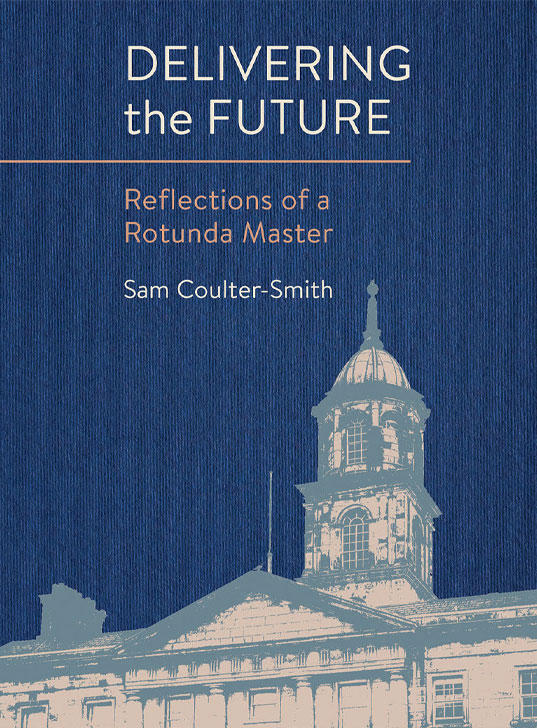Catherine Reilly speaks to Prof Sam Coulter-Smith about his new book detailing his experiences as Master of the Rotunda Hospital in Dublin and fears for the future of voluntary hospitals
“To be told ‘off you go, it is your risk, you manage it’; that was hard,” says Prof Sam Coulter-Smith, recalling the response from a HSE manager when he expressed serious concerns about under-resourcing and clinical risk at the Rotunda Hospital as Master (2009-2015). The recollection is included in his new book Delivering the Future – Reflections of a Rotunda Master, which describes a fractured relationship between the HSE and Rotunda, a voluntary hospital that receives most of its funding from the State.
The book’s central theme is the value of voluntary hospitals, which Prof Coulter-Smith considers to be threatened by structural changes in the health service and core elements of the Sláintecare plan.
“What I would love to see is a conversation around how we maintain voluntary hospitals in their current form within a new Sláintecare-type arrangement,” he informed the Medical Independent (MI).
He described Sláintecare as a “real threat” to the voluntary hospitals because the discretionary funding raised through “accommodation for fee-paying patients” allows them “to be responsive and to be able to change and move when required”. In addition, having an element of private practice is attractive to consultants and aids recruitment. In the book, Prof Coulter-Smith writes that consultants’ “vested interest” contributes to higher standards in all domains of the hospital “because that is what they want for their private patients”.
The governance structures in voluntary hospitals are “close to the coal face” with a clear chain of command. This facilitates the strategic thinking and development that is “lacking” in HSE hospitals due to “cumbersome” governance arrangements.
There have been many examples of innovation at the Rotunda, Prof Coulter-Smith told MI. These include the introduction of antenatal HIV screening, which has helped prevent cases of vertical transmission; the board’s use of discretionary funding to tackle gynaecology waiting lists; and a hub-and-spoke model that brings subspecialist foetal medicine services to maternity units in the RCSI Hospitals Group.
Conversely, a number of HSE initiatives are presented as not delivering on their aims. An example provided in the book is the maternity and new-born clinical management system (MN-CMS), which the HSE has been implementing in maternity units.
Its roll-out in the Rotunda demonstrates the perils of relinquishing control to the HSE, in Prof Coulter-Smith’s view. While there are positive aspects of the MN-CMS in relation to medication safety, laboratory ordering, and results availability, the patient record is “very” problematic.
“There are all sorts of issues in relation to understanding who a patient is, where they have come from, what their story is, how they have got to where they are. Particularly when it comes to when things don’t go well, reviewing, and learning from cases, I think that is incredibly difficult with this particular electronic record,” he said.
“We as clinicians in hospitals have lost control of it because we cannot make changes to it.”
The Rotunda told MI the book was written by Prof Coulter-Smith in a “private, personal capacity”. It would not be commenting on its contents, “which do not necessarily reflect the opinion of the Rotunda Hospital or the current executive management team.”
History
The history of the Rotunda is interwoven thematically. Prof Coulter-Smith also outlines a deep personal association with the hospital, his parents having met working at its domiciliary service (‘The District’) in the 1950s (his father Norman was a GP and his mother Joan was a nurse and midwife). Originally intent on becoming a GP, Prof Coulter-Smith did not get a training place and devised his own training plan. He successfully applied for a neonatal SHO position at the Rotunda in 1989. “As soon as I got in there I fell in love with the place and the plan changed; ‘no more GP, I am going to be an obstetrician’.” He undertook training in Dublin and London and was appointed as a consultant at the Rotunda in 2002.
The level of preparedness of today’s new consultants in obstetrics and gynaecology is discussed in the book. He writes that consultants and other doctors “are not on call quite as much as in the past, so young doctors do not get the same exposure to senior colleagues as I would have had. Nor do new recruits get the same level of clinical exposure we would have had at SHO and registrar level.” The European Working Time Directive “is responsible for much of this”.
Asked about this passage, he said: “I hate when people start with ‘in my day’, but there is no doubt that 20 years ago, when a person was appointed as a consultant, they had far more experience under their belt than a consultant appointed today. You don’t have to have done as much on-call, you haven’t had the same exposure to clinical services on the coalface that you would have had in the past. Training time is shorter, hours of work are shorter, so there are definitely less experienced people being appointed.”
“Now having said that, if you have more consultants, then you are going to have more senior people around, but it does create a two-tier system where you have the more experienced people and the younger, lesser experienced ones coming through. For the first couple of years, there is a lot of learning on the job. It can create difficulties sometimes because people can get exposed, and that is difficult.”
He said he was not advocating a return to the working hours of his own training days.
“No, it is different, times have changed. There wasn’t the same level of intensity…. Everyone’s expectations are so much higher than in the past, and the [caesarean] section rate was a fraction of what it is now. If you were on-call for the weekend, you would have expected to get some sleep; nowadays if you are on-call for a weekend you get no sleep, and that is just part of the intensity of the whole thing [which] has changed.”
Asked how new consultants can be better prepared, he said: “I think as consultants we need to be providing really one-to-one training for our trainees, so we are aware they get as much experience as they possibly can, given the shorter time of training.” He noted that gynaecology services in maternity hospitals have “really suffered” during the pandemic, which has impacted on patient access and training.
“In a five-year training programme, the registrars have lost two years of gynae training; that is a lot,” added Prof Coulter-Smith, who is incoming Chair of the Institute of Obstetricians and Gynaecologists.
In the book, Prof Coulter-Smith raises the point that increasing subspecialisation within the specialty has led to “pressing issues” in terms of recruitment, particularly in regard to maternity units at regional general hospitals.
Certain passages indicate such units require much more support. For example, in the context of discussing vaginal birth after a caesarean section, which Prof Coulter-Smith stated he was keen to encourage as Master, he cites an almost 50 per cent caesarean section rate at Cavan General Hospital.
There are also references to inadequate governance arrangements when the Rotunda provides hub-and-spoke services to HSE maternity units in the RCSI Hospitals Group. There remains a lack of clarity on the position of voluntary hospitals within Hospital Groups, Prof Coulter-Smith told MI.
“We sort of muddle through and that is fine most of the time, but occasionally you run into issues where it is difficult.”
‘Perfect storm’
Ireland was enveloped in a severe economic recession when Prof Coulter-Smith began his Mastership in 2009. There were massive cuts to health service funding and recruitment restrictions imposed. At times the Rotunda was “dangerously busy” and faced “simultaneous and consecutive emergencies”. Prof Coulter-Smith told MI the “skill and dedication” of staff was the reason the hospital navigated this period “as safely as we did”.
Prof Coulter-Smith escalated matters to the Department of Health and writes of feeling “deflated” after meetings with Dr James Reilly, then Minister for Health, believing the concerns about clinical risk were “not being taken seriously”.
In retrospect it was a “perfect storm”, Prof Coulter-Smith commented to MI. The country was deep in recession, the hospital faced the busiest period in its history, and an embryonic HSE was entering a relationship with voluntary hospitals “which they had never had before”.
“I think they felt they could control them in the same way as they did their own hospitals.”
One of his first tasks as Master was responding to a national scandal around organ retention. As with other hospitals, the Rotunda had retained tissue samples without permission for autopsy and research into neonatal death and stillbirth. In some instances, whole organs had not been returned to the baby before burial.
Prof Coulter-Smith writes: “At the time and historically it was considered too much for a bereaved couple to have to deal with being told that we were retaining their baby’s organs for a post-mortem. This was an outdated and paternalistic approach, and when it emerged that this had been happening, people were, rightly, very unhappy about it.” According to Prof Coulter-Smith, he was “transparent in identifying what had happened”.
He outlines the actions of the hospital to change processes and notes that, partly arising from this scandal, the hospital’s bereavement services were “transformed”. In broader terms the organ retention issue had “raised a red flag” in terms of management oversight in all areas of the hospital. The Rotunda overhauled the committee reporting structure and adopted a new system of reporting with key performance indicators devised and agreed with each department.
Prof Coulter-Smith writes in lesser detail about a patient’s death following induction for late intrauterine foetal death in March 2010. While unnamed in the book, Prof Coulter-Smith describes the death of Ms Bimbo Onanuga, following uterine rupture, as “really tragic”. He references one critical aspect of the case – an inherent weakness in the patient’s uterine wall, about which the hospital was unaware, according to Prof Coulter-Smith. However, there is no comment on the patient’s overall management, which prompted 11 HSE recommendations and charges of systemic failures in basic care voiced by maternity service advocates. While he writes that such incidents “have a profound effect on everyone associated with them”, there is no reference to any changes in processes arising from Ms Onanuga’s death.
Prof Coulter-Smith told MI he did not consider it was appropriate to speak about an individual case. He said there was a hospital internal review and a coroner’s inquest (which delivered a verdict of medical misadventure). He said guidelines on induction of labour for intrauterine foetal death were revised arising from the case.
The National Maternity Strategy, published in 2016, was developed during Prof Coulter-Smith’s time as Master. In his book, he states the agenda was dominated by a “vocal minority” who spoke about “over-medicalisation of obstetrics”. Prof Coulter-Smith believed midwives who managed home births “were coming at it with very strong opinions, but they do not necessarily have the data, the reporting structures or the clinical governance systems to back up what they are asking for”. He suggested that an “imbalance” of views in the development of the strategy had hindered implementation.
Asked what features of the strategy he found disagreeable, Prof Coulter-Smith firstly acknowledged that Covid-19 had impacted its implementation. In addition, he said the head of the HSE National Women and Infants Health Programme, Dr Peter McKenna, had been required to respond to CervicalCheck and other issues in recent years.
I found it quite helpful to write about these things, because in writing about them it helped me to process them
There was “lots of good stuff” in the strategy, including further developing community-based antenatal and postnatal care and concentrating the higher risk work in maternity units.
He continued: “I am a great believer that no-one working in healthcare should be solo when we have seen how, if there isn’t the appropriate oversight and systems in place to monitor outcomes, that things can go wrong. We have seen that with the Neary situation in Our Lady of Lourdes, Drogheda; we saw it in relation to organ retention in the Rotunda and other hospitals similarly.”
“[In regard to] independent midwives, I think, there needs to be the same level of accountability and oversight applied to the service they provide, as there would be for a maternity unit in a hospital setting. I think there are some very experienced and some very good independent midwives and there are some that are not quite so experienced and not quite so good, and I just think it is an area that needs to be thought about and systems put in place to ensure the way those services are being provided… have the appropriate levels of reporting and accountability, and I think currently they don’t.”
Separately, Prof Coulter-Smith also raises concerns in the book about direct-entry midwifery. He told MI that while many candidates were excellent, an element of their training was missing in regard to nursing experience.
“I think that was an unfortunate initiative. I think we have lost out a little bit in terms of the care we can give pregnant women because of that. Thankfully the vast majority of women are low risk… but healthy women get pregnant and become unwell through complications in pregnancy, and some of them can become quite unwell. Infection is a serious issue in some cases in pregnancy, and recognising a sick patient and recognising it early is really, really, important. So if you have a group of professionals who are not used to dealing with sick women, then there is a risk that you are not going to recognise that in time.”
End of term
The period after the conclusion of his Mastership was difficult for Prof Coulter-Smith. It’s an experience he describes with candour in the book and was “not unlike a bereavement”.
He told MI that “people who have been through it” warned him to expect a big change, but “it still hits you quite hard”.
“You have gone from being very busy, consumed by all of the issues and concerns that the hospital is involved with, and then suddenly those concerns don’t belong to you anymore, they belong to someone else. So it takes away your whole reason for being and that is quite a big deal because you have spent the past seven years doing it and being it, and then suddenly you are not anymore.”
He writes of discussing issues around this transition with the hospital’s board and he believes they have a duty of care to outgoing Masters.
In a particularly personal account, Prof Coulter-Smith also writes that over the course of his time as Master, he had “many different issues and concerns to deal with, as well as personal bereavements, including the deaths of my parents. I am sure I did not totally deal with all those things and in the two or three years after finishing the Mastership I found myself being buried under all those layers. It was taking its toll until I found a skilled professional to help me to deal with all of that.”
It is rare for consultants, and doctors generally, to speak so candidly on such issues and doing so is an encouragement to others to seek support. “It is a reflection of everything that happened and everything I did and things that happened to me during that time,” he said.
“The whole purpose of the book was to try and learn from looking back and if I can be honest and open about the way I feel about things and the way they happened, then maybe somebody else might just benefit from that.… I found it quite helpful to write about these things, because in writing about them it helped me to process them.”
Prof Coulter-Smith continues to work as a Consultant Obstetrician and Gynaecologist at the Rotunda – on a campus that is not fit for purpose. In May 2015 the then Minister for Health Leo Varadkar announced that the Rotunda would be co-located with Connolly Hospital. Prof Coulter-Smith told MI he finds it “hard” to see this happening, although he believes the Rotunda should have a strong relationship with all hospitals in the area, including Connolly.
“But I find it hard to see how Connolly will ever be upgraded to the level it needs to be to be able to support the Rotunda’s needs. It makes much more sense, I believe, for the Rotunda to maintain and improve its relationship with the Mater.”
He also considers that there would be space at the Mater to develop a new Rotunda.
“But I think right now, the current priority is for us to improve services as best we can and make them as safe as possible on the Parnell Square site until that decision happens.”














Leave a Reply
You must be logged in to post a comment.